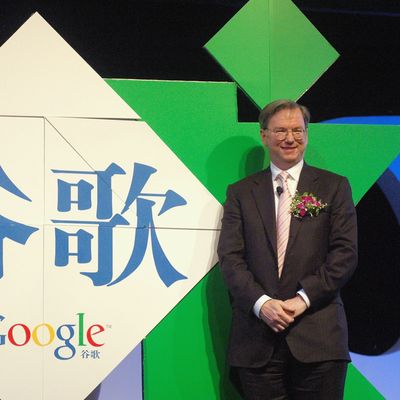
Former Google CEO Eric Schmidt foresees two internets in the near future: one used by most of the world, and an entirely separate one used by China. Per Schmidt:
“I think the most likely scenario now is not a splintering, but rather a bifurcation into a Chinese-led internet and a non-Chinese internet led by America. […] I think you’re going to see fantastic leadership in products and services from China. There’s a real danger that along with those products and services comes a different leadership regime from government, with censorship, controls, etc.
Schmidt’s prediction has drawn a fair amount of attention — any time the former head of the world’s biggest search engine predicts China will have its own internet in the near future, it’s gonna turn some heads.
Schmidt’s quote was given at a private event on September 19 at the buzzy investment firm Village Global VC. So the normal, rational thing to do is to assume Schmidt comments were given largely off the cuff, reflecting only his own views on the future of the Web and without any strategic or longer-term plays in mind.
But! Let’s not be normal or rational. Let’s assume that Schmidt knew anything he said was going to eventually make its way to the public, or at least to people who spend too much time dissecting what the doyens of Silicon Valley say.
There are two interesting bits to consider here. One, there’s the widely held belief that Schmidt’s departure as CEO from Google in 2011 was over an argument between himself and Google co-founders Larry Page and Sergey Brin. Page and Brin wanted Google out of China, mainly due to China’s heavy censorship of the internet. Schmidt, seeing a massive market and growing middle class, wanted to stay in. He lost the fight, Google left China in 2010, and Schmidt stepped down as CEO months afterward. (He remained the executive chairman of Googe’s holding company, Alphabet, until mid-2017, but by all accounts was largely hands-off in the role.)
But Google is a different beast than it was in 2010, with about four times the gross revenue, four times the number of employees, and the need to find even more human beings to use its products. Page and Brin are largely MIA these days. Meanwhile, Google CEO Sundar Pichai has said that Google is in the “exploration stage” as to whether to reenter China. Details about a Google search engine built specifically for the Chinese, code-named Dragonfly, keep leaking to the press (mainly due to internal dissent from Google’s own employees).
Two, Schmidt is still one of the largest individual shareholders of Google stock. If you wanted to get really wheels-within-wheels and conspiracy-minded about the whole thing, you could look at it like this: Schmidt’s prediction of a separate Chinese internet was a strategic move on his part. Google (and therefore Schmidt) stands to make tremendous amounts of money if it can successfully enter the Chinese market. Tell a well-heeled and well-connected crowd that a separate Chinese internet is an inevitability, with some regrettable but unavoidable censorship and state control, and you make Google’s entry into the market slightly easier to stomach in a Silicon Valley culture that ostensibly still highly prizes the ideals of openness, privacy, and freedom from censorship.
Or maybe Schmidt was just shooting the shit over drinks with other tech elite, and his comments are now being overly scrutinized by tech writers trying to drum up a story. Who can possibly say!





























